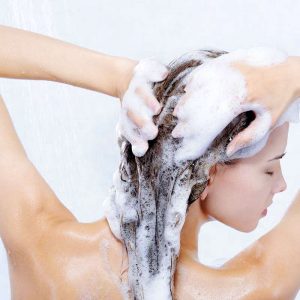Healthy Lifestyle for Healthy Hair
- September 28, 2017
- Posted by: admin
- Category: Ayur Yoga,

By Saandhi
How Does Hair Grow?
A single hair follicle grows its hair strand over a period of four to six years (the anagen phase). It then rests for two to four months (the telogen phase), after which it loses the “old” hair as a new hair shaft grows and pushes out its predecessor. When the new hair grows in, it does so at a rate of approximately half an inch per month. According to the scientific research, there are three stages that hair goes through—a growth phase, a transition phase, and a resting phase. As you get older, your hair spends more time in the last cycle, which means you’re shedding hair faster than its growing back in.
Why Do We Lose Our Hair?
Hormonal Changes
Hormonal changes and imbalances can cause temporary hair loss. This could be due to pregnancy, childbirth or the onset of menopause.
Testosterone and DHT
One of the main mechanisms behind hair loss is the enzyme 5 alpha-reductase, which converts testosterone into the hormone dihydrotestosterone (DHT). When DHT is formed, it reduces the size of hair follicles in people with a genetic predisposition to hair loss, and over time, the smaller follicles produce shorter and thinner hair.
The Thyroid Gland
The health of the thyroid gland can also impact hair loss. Although it is not always linked, thinning of the hair is a very common symptom of an underactive thyroid gland, or hypothyroidism. Sea vegetables such as nori, kelp, dulse, kombu and wakame are rich in the mineral iodine, which has been shown to support a healthy thyroid gland. These foods can be enjoyed in a variety of East Asian dishes, or taken in supplement form. As well as making dietary changes, it may be worth investing in a water filter, to filter out minerals such as fluoride and chlorine. These chemicals can prevent the body from absorbing iodine and lead to complications.
Genetics
Genetics is the most common cause of hair loss, especially in males. Estimates indicate that more than 80% of cases of male pattern baldness are hereditary.
Poor circulation of blood in the scalp
Just like any other part of the body, our hair needs a good blood supply to provide micronutrients and amino acids needed for healthy growth. Minerals such as zinc, iron, selenium, magnesium and calcium are all involved in the production of healthy hairs. The proteins collagen and keratin provide the hair with structural integrity. These proteins are made up of chains of amino acids, which need to be delivered via the blood. If the blood supply is low, no amount of supplementation will be able to hold back the baldness.

Stress
Physical and emotional stress can cause hair loss. Surgery, high fevers, and blood loss can cause enough stress to cause excessive shedding. As well as increasing the risk of developing a number of nasty illnesses, chronic stress can impact hormone levels, increasing cortisol. If not dealt with soon, this can have a knock on effect on the liver, and lead to increased DHT levels. This increase in DHT reduces the size of hair follicles, leading to hair loss and thinning. Effective remedies to stress include relaxing activities such as meditation, yoga, reading or walking.
Nutritional deficiency
Our hair is only as healthy as our diet and how well our body absorbs the nutrients we eat. Zinc is also responsible for helping you grow new hair, and zinc deficiency is usually the reason for premature hair loss in men and women. You can increase your consumption of foods that have been shown to aid in hair growth. So make sure that your diet is based mainly on fresh, whole, plant foods such as fruits, veggies, wholegrains, legumes, nuts and seeds.
- Nuts are rich in selenium, a mineral that helps to improve hair strength.
- Wholegrains are heart healthy and contain the minerals zinc and magnesium, which are both involved in the growth of healthy hair.
- Leafy greens are iron rich, increasing blood flow and nutrient availability to hair follicles.
- Berries are rich in vitamin C, which increases the availability of iron.
- Legumes are rich in protein, providing the amino acids needed to maintain structural integrity in the hair.
Medications
Pharmaceuticals can come with a long list of side effects, including hair loss. Chemotherapy is one of them. Using any of these medications can lead to hair fall:
- thyroid medications
- some oral contraceptives
- beta-blockers
- anticonvulsants
- antidepressants
- Anticoagulant

Skin conditions
Skin conditions like psoriasis and dermatitis can occur on the scalp and interfere with hair growth. Infections, such as ringworm, can invade the hair and skin of your scalp, leading to scaly patches and hair loss. Once infections are treated, hair generally grows back.
Alopecia areata
It is an autoimmune disease that affects up to 2% of the population. It causes round patches of hair loss and can lead to total baldness.
Natural hair loss
For many people, hair loss is just a part of the natural ageing process. The average adult loses around 100 hairs from their head every single day, simply as a result of the ageing process
Safe Your Hair!
Here are a few techniques you can explore to improve your hair care habits:

Regular head massages oils can help to break down plaque and free the hair follicles.

Showers in the morning have also been shown to reduce sebum production.

Aloe vera is a natural ingredient in some shampoo and conditioners that can bring plaque to the surface and break it down. It also has alkalizing properties that help to reduce inflammation.

The lauric acid found in coconut oil binds to the protein in hair and protects both the roots and strands of hair from breakage. Coconut oil is known to mimic Sebum. Sebum is the body’s own natural oil that helps keep the scalp from drying out and also coats hair roots to protect them from damage. A well-oiled scalp with happy follicles is the key to stopping continued hair loss. Coconut oil penetrates the hair shaft, protecting it against environmental impurities and excess heat. The natural antioxidants and nutrients (vitamin E, vitamin K and iron) found in coconut oil boosts hair growth and regrowth. Coconut oil contains both antifungal and antibacterial properties to protect against potential fungal or bacterial problems that limit hair growth. When you massage your scalp with coconut oil it improves the blood circulation to the scalp and hair follicles, which helps hair follicles to absorb the valuable nutrients in the oil necessary for hair re-growth.

Smoking, pollution, diet and many other factors can cause reduced blood flow to the scalp. Improving your diet and lifestyle can make a big difference.

Herbs like Bringaraj are known for treating hair loss problems and other scalp issues. However, the Bhringraj benefits are not limited to hair alone; it also treats various digestive issues, lungs problem, and many other health problems.

Yoga inversions such as mountain pose, shoulder stand, headstands and handstands improves blood circulation to the head and increases rate of hair growth.
Call us at MAYI AyurYoga for more info on hair treatments and appointments at 03-6127 5693.
